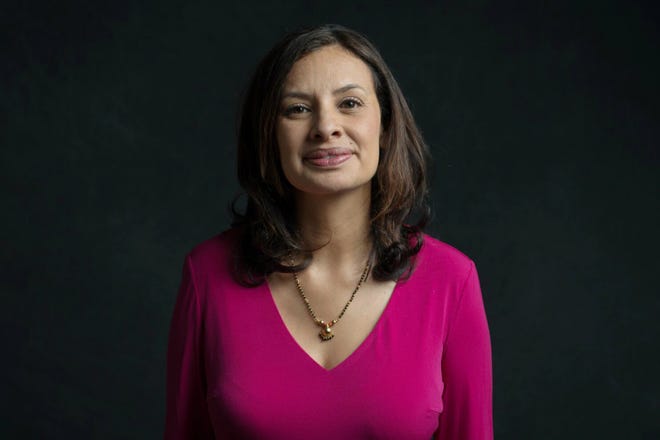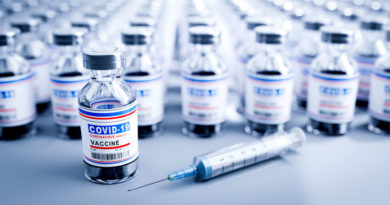‘You can’t trust the government’: Spanish-speaking social media spreads COVID-19 vaccine disinformation, adds to hesitancy
It took Maria Teresa Kumar weeks to find out why her mom wouldn’t take a COVID-19 vaccine and to convince her it is safe.
Kumar’s mother, a Colombian-American woman who runs a small elder-care facility in Northern California, received a video on WhatsApp featuring a speaker who claimed to be a pharmacist. In Spanish, the speaker warned viewers not to get the shot, because it was a “new technology never introduced into humans before.”
It was one of several alarming videos her mother shared with her, all laced with unbacked, fear-mongering claims surrounding COVID-19 vaccines.
Disinformation has been circulating on social media and messaging apps like WhatsApp. Experts worry it’s targeting people of color most vulnerable to the illness, contributing to vaccine hesitancy and fueling mistrust.
“It took me seven weeks to convince my mother to take the vaccine. And she’s in the health care profession,” said Kumar, head of civic engagement group Voto Latino. “She was embarrassed to tell me why. So, I think deep down she knew something was off, but she didn’t know how to explain it to me.”

According to a recent survey by Voto Latino, almost 73% of Latino people surveyed knew someone who had COVID-19, and a third knew someone who died of the illness.
Despite that, just shy of half – 47% – said they were reticent about getting the shot. Around a quarter said they would not take it at all.
“It’s a huge number,” Kumar said in a recent online panel discussion about the topic. “Of the 47%, you had a good 23% that said ‘maybe I’ll take it.’ The other part is going to be a lot harder.”
About the videos, she added, “It was also with undertones of ‘you can’t trust the government,’ ‘the government is not on your side,’” – sentiments that only fuel mistrust already planted by government-backed medical abuses on Black, Latino and Native American people.
Héctor Alcalá, a public health professor at Stony Brook University, echoed Kumar’s experiences.
His mother also received a concerning video she saw on Facebook. In it, a Spanish-speaking person who claimed to be a medical professional said the vaccine was being developed too quickly and cautioned the shot would cause a slew of diseases.
“I had to tell her this isn’t true, this isn’t vetted,” said Alcalá, who specializes in family, community and population health. “I had to be proactive with my own family.”
COVID-19 crisis: Vaccine conspiracy theories, hoaxes in Spanish targeting Hispanic community breed fear, hesitancy
Though Facebook has said in company statements it will work to fight disinformation pervading its platform in Spanish, advocates say damage has been done. They say Facebook’s Spanish fact-checking system pales in comparison to English.
“When you introduce that targeted social media into communities like African Americans who have natural mistrust, where the ground is fertile to receive that information, those weeds take root and grow like wildfire if there is no opposition, if there is no one uprooting the weeds,” Dr. Melissa Clarke, an emergency medicine doctor and population health expert said in another ‘infodemic’ webinar hosted by the Center for Health Journalism. Clarke is co-founder of the Black Coalition Against COVID-19.
Adding to the insidiousness of the issue, Clarke said “the best misinformation has grains of truth in it.”
History, disinformation create ‘perfect storm’ for low vaccination rates
History’s medical abuses – the Tuskegee syphilis study that withheld treatment from Black men, or coerced sterilizations of Black, Latina and Native American women – don’t help to cultivate trust.
“If you’re trying to say, ‘trust us’ – you have to have earned that trust,” Clarke said. “And unfortunately we don’t have a history in this country of earning the trust of the African-American community.”
But, Clarke noted, contemporary health care inequalities experienced by people of color also fuel vulnerability to disinformation. Studies show Black patients receive fewer referrals for life-saving treatments, such as heart catherization for heart disease, treating pain or kidney dialysis.

“That happens unequally for African-American and Latino patients – very well documented in the medical literature,” Clarke said. “A lot of times, because of those health care disparities … African-Americans don’t have a relationship with a provider that they can go to to get their questions answered. In that information gap, they’re more than likely going to turn to somebody who they do trust who might be heavily influenced by social media – and therefore, you get misinformation spreading.”
Alcalá’s mother received her first vaccine dose, and her son’s expertise quelled her fears. Still, others don’t have such access.
‘We are going to have to save ourselves’:Black community fights deadly COVID vaccine conspiracy theories
“Right now, the main concern in terms of people of color not getting the vaccine is more an issue of access. But yes, the issue of vaccine hesitancy will become more salient and important over time and we can be proactive to address it,” Alcalá said.
Alcalá said “barriers combined with misinformation can create the perfect storm” for low vaccination rates.
“Ultimately what determines whether or not we get the vaccine isn’t going to be a single factor,” Alcalá said. “If you think about, I’m potentially a person who is seeing misinformation online. I want to get the vaccine, but in the context of still seeing this information, I go online, find that it’s a little cumbersome and then think, ‘Well, oh well –I’m also hearing that this vaccine might actually be harmful.’”
How ‘hyperlocal’ messaging campaigns can combat COVID-19 vaccine lies
A USA TODAY-Network analysis found COVID-19 vaccination rates among Latinos lagging in Texas, particularly in the state capital of Austin.
But experts like Clarke also agree that polls shoulddisaggregate by national origin. For example, an immigrant from Ethiopia or Nigeria may not be swayed by the same lever as a Black person who is not an immigrant.
She referenced a study by George Washington University and the department of health in Washington, D.C., which has the largest Ethiopian immigrant population in the country. The study showed the population’s largest concern about the COVID-19 vaccine isn’t vaccination itself or the nation’s history of abuses, but the monetization of health care.
Tracking COVID-19 vaccine distribution by state:How many people have been vaccinated in the US?
Understanding specific communities’ concerns can lead to more informed public health education targeted to those groups, she explained. Her group is creating polls and working on “hyperlocal” messaging campaigns for sub-communities within the African American population, partnering with trusted messengers from the communities. She also streams a weekly live show called “Excuse Me Dr.!” to debunk misconceptions.
Abigail Echo-Hawk, chief research officer at the Seattle Indian Health Board, has also been working to fight disinformation in her community.
The Pawnee Nation member pointed to a recent editorial written by a non-Native that claimed Native Americans specifically shouldn’t take the Johnson & Johnson vaccine. The op/ed, published on an American Indian news website, lacked sound science and caused alarm among communities, she said.
She worked with other tribal epidemiology centers, scientists and the American Indian Physicians Association to refute his claims, which she called “reckless and dangerous.”
“We spent time going through every single one of his allegations and creating documents to refute every single one of them,” Echo-Hawk said, adding the organizations published a scientific rebuttal and reached out to urban and rural groups to reassure them the vaccine is safe.
Similarly, Voto Latino is working with local groups to monitor and fact-check disinformation. “It becomes a feedback loop, and then we spit out the right information so that they’re inoculated,” Kumar said.
Kumar said many of the disinformation circulates in WhatsApp groups. The messages, videos or graphics are then forwarded repeatedly.
“I do believe there’s a very different strategy for non-native English speakers.” Kumar said, adding she’s seen the same in Caribbean and South Asian communities.

Dr. Alisahah Cole, system vice president for population health innovation and policy at CommonSpirit Health, said her team created a tool kit for outreach to people of color and vulnerable populations and chronic medical conditions.
“We used a stratification tool that uses some of those demographics and then said, ‘OK, if someone falls into that high-risk category, we need to reach out with a phone call,’” she said, adding it’s a way to initiate conversation and leverage a trusted relationship between provider and patient to address vaccine concerns.
“We need to be really, really thoughtful about the disinformation that is happening,” Cole said. “One of the key ways we can do that is to make sure we are reaching out directly to those patients and to those community members.”
Reach Nada Hassanein at nhassanein@usatoday.com or on Twitter @nhassanein_.


